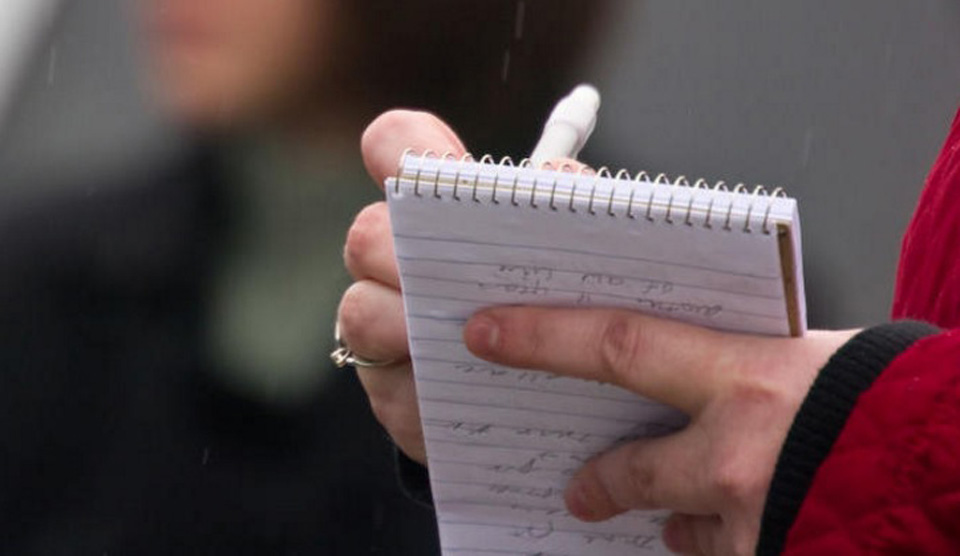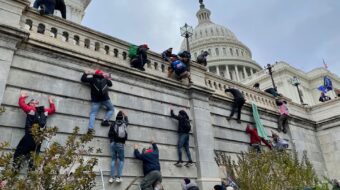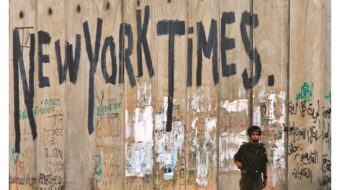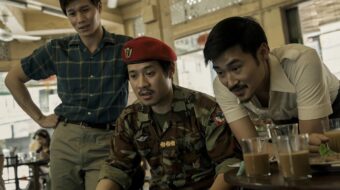
“In Donald Trump’s America,” says the Los Angeles Times in a recent editorial headlined “The War on Journalism,” “the mere act of reporting news unflattering to the president is held up as evidence of bias. Journalists are slandered as ‘enemies of the people.’ Facts that contradict Trump’s version of reality are dismissed as ‘fake news.’ Reporters and their news organizations are ‘pathetic,’ ‘very dishonest,’ ‘failing,’ and even, in one memorable turn of phrase, ‘a pile of garbage.’”
The runner-up in the 2016 election’s popular vote is hardly the first authoritarian to disparage the press, or worse—censor, imprison, or murder journalists. Attacks on freedom of the press occur every day in many countries of the world.
World Press Freedom Day on May 3 celebrates the fundamental principles of press freedom. It was established to evaluate press freedom around the world, to defend the media from attacks on their independence and to pay tribute to journalists who have lost their lives in the exercise of their profession.
This year, UNESCO, the government of Indonesia, and the Press Council of Indonesia will co-organize the World Press Freedom Day’s main event, including the UNESCO/Guillermo Cano World Press Freedom Prize Ceremony, in Jakarta, Indonesia, May 1-4, “Critical Minds for Critical Times: Media’s role in advancing peaceful, just and inclusive societies.” Over 100 other national celebrations take place each year to commemorate this day.
The international day was proclaimed by the UN General Assembly in 1993 following a call by African journalists who in 1991 produced the landmark Windhoek Declaration on media pluralism and independence.
Justice for all a prerequisite for freedom of expression and sustainable development
The rule of law forms an integral part of a democratic and inclusive society. It protects fundamental freedoms and applies universally to each individual and entity. Weak institutions, a weak judiciary, and lack of access to justice greatly impede sustainable development. Without a well functioning legal and regulatory environment, the public loses confidence in the democratic process and no longer invests in its sustainable future.
Only when media are free, independent and pluralistic can they ensure that the rule of law is applied and respected in full. Conversely, only a legal framework that safeguards freedom of expression and freedom of information allows for such a media sector to emerge. Free media and an independent, effective judiciary play a mutually reinforcing role as pillars of democracy.
Journalists are not only major users of the cherished right to freedom of expression but also symbols of the extent to which a society tolerates and/or promotes freedom of expression. The current state of safety of journalists worldwide is discouraging: Over the last decade 827 journalists and media workers have been killed. Even more alarming is the fact that in less than one out of ten cases the perpetrators have been caught.
Judicial systems worldwide need to be strengthened with a key focus on protecting freedom of expression and the safety of journalists. The three “P” approach must be applied to ensure a safe media environment: Prevention of violence against media; Protection of journalists in danger; and Prosecution of perpetrators of crimes committed against media professionals.
Promoting the media as a catalyzer of peace and mutual understanding
The media often play a central role in conflict and crisis situations. Independent, objective media can help defuse tension, promote dialogue, and contain conflicts. Conversely, biased and untrue reporting can exacerbate violence. When misused for propaganda purposes, the media can contribute to inciting hatred and spreading rumors. Moreover, in situations of armed conflict and disaster, the risks faced by journalists are significantly multiplied. An additional threat to peace and security, human rights, and justice is the spread of violent extremism catalyzed by terrorist and extremist groups. These groups have used social media as a tool for the global, real-time communication of intolerant messages.
The digital era has enhanced opportunities for access to information, the creation and sharing of knowledge, facilitating exchange as well as intercultural dialogue. However, the rise of online hate speech shows that digital technologies also carry with them a number of challenges. One of these is striking the right balance between freedom of expression online and respect for equality and human dignity. Countering hate speech and violent extremism online calls for a holistic approach that addresses the root causes of tension and division within societies. The media can provide a platform for a multitude of voices and perspectives that can help strengthen tolerance, dialogue and critical thinking. They can also offer counter-narratives to challenge the ideas promoted in violent extremism narratives. Finally, countering extremist narratives comes hand in hand with empowering media users with the skills needed to navigate the Internet, and interpret, reject and react to hateful and inciting messages.
Freedom of expression and freedom of information foster more inclusive societies
Enabled by digital technologies, public participation in the media has allowed for a democratization of narrative and intercultural dialogue. However, the increased supply and demand of information has laid bare the role of Internet intermediaries, the compromise of the confidentiality of sources, the risks in terms of digital safety faced by journalists, the rise of online hate speech, and the digital divide. The large discrepancy of access to information both between and within countries, as well as between men and women, demonstrates that the Information Age duly supplied the tools but not the envisioned fully connected world. In order for freedom of expression to be universally applied and for sustainable development to thrive, information must become available to all without restrictions. Digital illiteracy is another obstacle in this regard.
By enabling the empowerment of citizens, freedom of information is a cornerstone of participatory democracy. It also plays an essential role in promoting accountable and effective institutions which support the rule of law.
Media are important actors in promoting social inclusion. Their potential to promote dialogue, reflect the diversity of opinions and perspectives in society, and challenge stereotypes and misrepresentations, is to be encouraged. Supporting pluralism and gender equality in the media is central to this process.
Only an inclusive society, facilitated by independent and pluralistic media and a safe media environment where the free flow of information is fostered, provides the necessary conditions to achieve a better future for all.
The Guillermo Cano World Press Freedom Prize
An independent international jury of media professionals unanimously recommended Dawit Isaak for the 2017 UNESCO/Guillermo Cano World Press Freedom Prize in recognition of his courage, resistance and commitment to freedom of expression.
“Dawit Isaak joins a long list of courageous journalists who have persevered to shed light in the dark spaces; keeping their communities informed against all odds,” said Cilla Benkö, president of the 2017 prize jury. “Some have given their lives in the pursuit of truth. Many have been imprisoned. Dawit Isaak has spent nearly 16 years in jail, without charge or trial. I sincerely hope that with this award the world will say, ‘Free Dawit Isaak Now.’”
An Eritrean playwright, journalist and writer, Dawit Isaak moved to Sweden in 1987, where he became a citizen and went into self-imposed exile. After the independence of Eritrea, he returned to his homeland to become a founder and reporter for Setit, the first independent newspaper in the country. He was known for his critical and insightful reporting. His present whereabouts are unknown.
Created by UNESCO’s executive board in 1997, the annual World Press Freedom Prize honors Guillermo Cano Isaza, a Colombian journalist who was assassinated in front of the offices of his newspaper, El Espectador, in Bogotá, in 1986.
Source: UNESCO












Comments